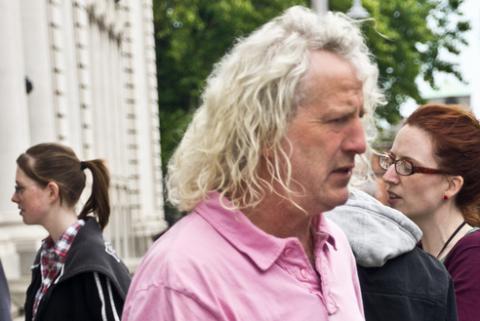Getting to the bottom of Mick Wallace's defence

The claim by Mick Wallace that he needed to make a false Vat declaration because of cashflow difficulties raises questions. By Vincent Browne.
There are questions about TD Mick Wallace's explanation for having made a false Vat declaration on behalf of his construction company.
He said he needed to do that on a short-term basis to ensure a positive cashflow for his company, which was in financial trouble, and he said that he intended to correct the falsification and pay the tax due at a later stage.
Many companies that get into cashflow difficulties fail to pay their due taxes on time for cashflow reasons, even though they have made true declarations of the Vat and other taxes due.
In their annual report for 2010, the Revenue Commissioners disclosed that the tax debt - ie, the amount of tax overdue - was €1.4 billion, and that the debt available for collection that was over three years old was €472 million. So there is nothing unusual about late payments.
Indeed, the Revenue Commissioners stated in their 2010 report: "Non-compliance is an ever-present challenge for Revenue administrations but in periods of recession, this challenge grows." They made the point: "Our approach is tempered by a concern not to impose undue burdens on taxpayers experiencing temporary cashflow difficulties. We can and do put alternative arrangements in place to help customers through difficult periods."
So the claim by Wallace that he needed to make a false Vat declaration because of cashflow difficulties raises questions.
He could have made a true declaration and then delayed making the payments, as happens with distressed companies all over the country.
Inevitably, he would have been hassled by the Revenue over the payments but, like thousands of other companies, he could have come to an arrangement with it on a schedule of payments.
So why did he make a false declaration? It is unlikely to have been because of his company's cashflow difficulties - those would have arisen if he had made the payment, not from making a true declaration.
When did he intend to tell Revenue about the false declaration? Was he afraid that a liquidator or receiver of his company would uncover it, prompting him to own up?
I phoned Mick Wallace in Poland and asked him about this. He said that, at the time, "the Revenue was not doing deals, they would have put us out of business".
I said this was not true; the Revenue always did such deals. He said he was advised by his accountant this was not so.
I asked if his accountant had advised him to make a false declaration, and he replied: "I am not saying that; it was my decision."
I put it to him that he had made a false declaration intending to defraud the Revenue, and then he got cold feet and owned up because he thought he would be caught.
He said: "I swear that is not the case. I fully intended correcting the declaration and paying the taxes due."
I asked him why he was off at a football championship in Poland while the Dáil was sitting, given that, shortly after he entered the Dáil, he expressed wonderment that so few deputies were in the chamber.
He said he had the best attendance record of any TD in the Dáil, and his Wexford constituents would be surprised if he did not go to the European Championships, given his known involvement in football.
That's his case.
But all that said, I think Fine Gael deputies have a cheek - particularly long-standing Fine Gael ones such as Charlie Flanagan - to call for "consequences" for Wallace because of his false Vat declaration.
Fine Gael engaged corporately in persistent tax fraud for a period of nine years in the 1990s by making "under the counter" payments to members of its headquarters staff. Enda Kenny, Michael Noonan, Charlie Flanagan, Frances FitzGerald and Richard Bruton were TDs while this was happening.
I am not saying that any of these were in any way implicated in the fraud, or that they knew at the time that the fraud was taking place.
But some of them knew about it afterwards and there was no rush to a public confession.
Indeed, Noonan, who was leader of the party in 2001, was bounced into an acknowledgment of the fraud when the media became aware of it.
So if it is appropriate for "consequences" (apart from the usual penalties for tax fraud, as Flanagan has called for) to apply to a TD who made a false tax declaration on a once-off basis, what are the appropriate "consequences" for a political party that engaged in such fraud, not just on a once-off basis, but persistently over nine years?
Or is that now all irrelevant because it happened in the 1990s and it's all "past"?
Anyway, which is worse: making a false Vat declaration or seeking election to government office largely on the basis of a promise to seek a write-down the bank debt, and then never even seeking to do that on attaining office, as Kenny has stated repeatedly in the Dáil?
Is that not a far more serious fraud - or is that just politics? And who cares about election promises? {jathumbnailoff}
Image top: infomatique.
